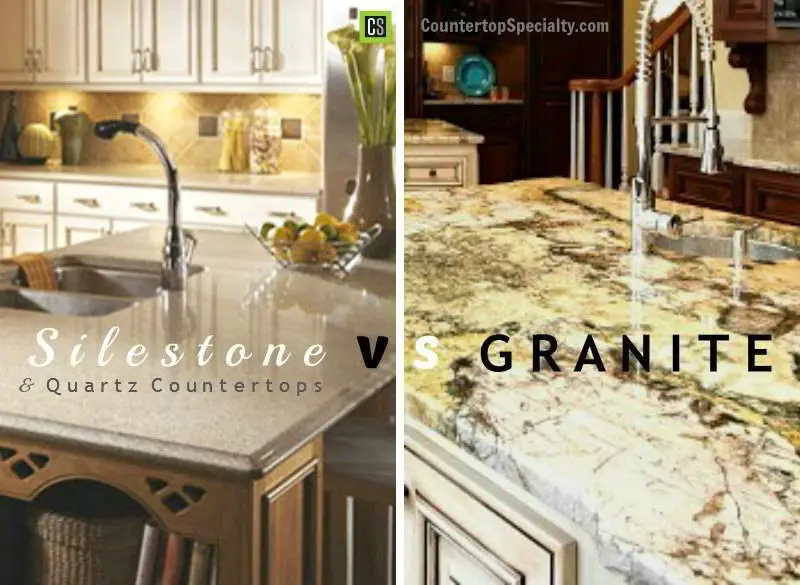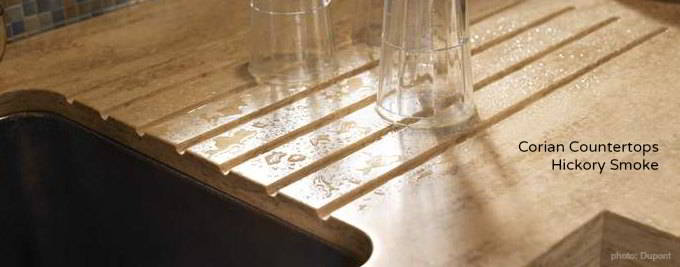Quartz vs. Granite vs. Corian
Countertop Materials Comparison
Choosing countertop materials can be fun and frustrating! You have many choices, but you also have to dig beneath marketing messages and decipher conflicting or incomplete information.
On the Kitchen Countertops Guides page you read an overview of the many options for countertop materials available today including various natural stone and man-made surfaces.
On this page.... we'll make an in-depth analysis and discuss the Top 3 surfaces causing most of the consumer confusion... Granite vs. Quartz vs. Corian.
Silestone Quartz vs Granite Countertops
Silestone is the most recognized and leading producer of quartz countertops, however, this discussion applies to granite vs. quartz countertops of all brands, and Corian.
Despite marketing efforts by quartz manufacturers to convince you otherwise, there isn’t any significant difference regarding performance, function, cleaning or price between granite countertops and Silestone, Zodiaq, Caesarstone, Cambria countertops or other quartz countertop brands.
To be clear, the above statement is not a criticism of quartz countertops. Not at all.... we're fans.
Our only aim is to provide tips on choosing countertops with an accurate and unbiased comparison of quartz vs. granite countertops (and Corian below), which can get blown out of proportion in some circles.
Sealing & Cleaning: Quartz vs. Granite vs. Corian
True, you don't have to seal engineered stone countertops. And you don't have to apply a sealer to Corian countertops either.
But the supposed "hassle" of sealing granite and the frequency required has been greatly exaggerated by. . . marketing.
Applying a granite sealer is really a very simple and infrequent "wipe on, wipe off" procedure with a typical sealer. And it's a rare slab that needs sealing every 6 months as commonly stated.
An average stone countertop will need sealing every 3 - 8 years depending on porosity and type of sealer used.
Sealing granite countertops can be a ONE-TIME deal, if you use the more advanced Permanent Bond Sealer.
Or buy granite that NEVER needs sealing and it's a moot point.
WHAT? ..... Doesn't all natural stone need sealing?
No, that's a marketing myth perpetuated by both sealer and quartz countertop manufacturers.
There are over 2500 granite varieties. Many of the darker colors (blacks, browns, blues, greens) are incredibly dense, virtually non-absorbent and never need sealing.
When shopping for natural stone all you need to do is perform the simple water test to determine how absorbent the stone is and whether it may need sealing.
This test will easily rule out a granite color that is too porous and/or reveal a really bomber slab that will be breeze to maintain.
Thus, the "sealing" issue is not a relevant factor when deciding between these two countertop materials.
And it doesn't take a closet full of special chemicals to protect your granite counters or keep its luster as Cambria countertops and other quartz countertop manufacturers suggest on their websites.
Hey, to their credit they are just trying to effectively market their product.
Another small myth about sealing...
You may also read that you must seal granite to maintain its shiny polish. Not true. Sealing is for stain resistance. Both natural and synthetic stone kitchen countertops are polished by grinding and buffing the surface into a smooth shine.
Cleaning... a little secret about granite...
After an initial sealing (if needed), you could do nothing but wipe it with a sponge for years and it would still look pretty good.
Minor, easy maintenance performed periodically using recommended cleaning products will, however, give you peace of mind and bring out the best in your granite countertops so they always look gorgeous.
Cleaning Quartz and Corian
And the same can be said about quartz and Corian. Care and cleaning is equally easy for either of these countertop materials.
Except you must use a proper quartz cleaner (for Corian too) and take extra care with quartz countertops as certain chemicals can discolor the surface and create a permanent quartz countertop stain.
What About Bacteria On Granite?
Silestone also states their product resists bacteria while granite "harbors" bacteria.
This is totally false.
Countertop "cleanability" studies prove that both granite and quartz are among the safest and
cleanest countertops materials on the market today, but one isn't
superior to the other.
The study comparing granite, marble and quartz surfaces concluded:
All surfaces easily met the general FDA criteria for sanitizing... Overall, there was no statistical difference in reduction after wash and rinse for any of the four surfaces. This indicates that the differences in surfaces as discussed in the introduction did not make a significant food safety difference in cleanability. (Hospitality Institute of Technology and Management, 2006)
Value & Color Options
As mentioned, Silestone and other quartz countertops have narrower color palette compared to granite, but still a broad range of colors is available to suit any kitchen design theme.
And quartz countertop manufacturers are continually adding new colors and patterns many of which are distinctly unique and very attractive.
Corian countertops offer the fewest color choices by far. But most are modern and tasteful.
Granite enjoys a greater "prestige" due to it's natural uniqueness and is, therefore, typically perceived as having greater value in the minds of most homeowners and buyers.
Although, it is now common to see Silestone and other quartz counters used in high-end installations as well.
Decisions, Decisions... Granite or Quartz Countertop?
Once all the above is understood, deciding on granite vs. quartz countertops like Silestone, Cambria, Caesarstone, Zodiaq, Hanstone, Avanza or other brands really comes down to color, pattern, and perceived value for most buyers.
Both counter tops materials are excellent, but neither is significantly different from the other regarding performance or any meaningful, practical matter.
Granite does have the edge when considering repairs. All types of natural stone can almost always be repaired, however, chemical damage to quartz countertops is usually permanent.
The good news is that it is very difficult and rare to stain or damage quartz countertops, so this is not a major issue either.
The major point here is that only minor differences exist between these two countertop materials.
Engineered stone products make excellent countertops with qualities and performance as good as granite.
So if you find that perfect color and pattern from Silestone or other quartz brands, then you can bet you’ll be very satisfied.
Corian Countertops vs. Granite: Pros & Cons
Unlike quartz and granite, Corian countertops and granite do not share similar qualities. Corian and other solid surface countertop brands are not as durable, but offer some truly unique characteristics.
Corian Countertop Characteristics
- Corian colors are a bit limited and some say "boring", although this is improving considerably with new additions. A sufficiently wide spectrum is currently offered.
- Corian solid surface is somewhat easily dented, damaged by hot pans and scratches from knives.
- Corian is also stain-resistant, but does not require sealing. Stains and scratches are much more easily repaired than with granite, although scratches occur far more easily on a solid surface countertop.
- Corian can be installed without seams. If seams are necessary, they are virtually invisible.
- Corian can be formed into nearly any shape, include inlays, drain-boards and molded, "built-in" sinks.
Granite Countertop Characteristics
- Granite offers almost unlimited choice in colors and patterns.
- Granite is heat, scratch, dent and chemical resistant. Truly almost impossible to damage in this way.
- Granite is also chemical resistant, but requires sealing for optimum stain-protection.
- Granite will have visible seams on most countertops.
Which is more durable quartz or Corian?
Overall quartz is more durable and can withstand heat and scratches better than Corian. Both can be discolored by some chemicals.
However, damage to Corian can usually be repaired where quartz can sustain permanent damage.
Granite vs. Corian vs. Quartz Countertops Price
Surprisingly, Corian prices can be similar to the cost of granite countertops. Granite used to be the most expensive but prices have declined in recent years while quartz prices have increased.
- Granite costs $45 - $65/sq. ft. on average (range is $35 - $200)
- Corian costs $45 - $65/sq. ft. on average (range is $35 - $100)
- Quartz costs $65 - $85/sq. ft. on average (range is $50 - $150)
High-end granite colors will be more expensive but the average cost of installation for many common granite colors is about the same now as Corian.
Quartz countertops are the most expensive of the three on average. Tariffs on quartz slab imports have bumped up prices quite a bit since 2018.
But any of the three could be cheaper or more expensive depending on your choices and installation variables. So, you need to get quotes.
What Is The Best Material For A Kitchen Countertop?
When considering all the pros and cons, most people--myself and most professionals included--agree that:
- Granite is the best of all countertop materials
- Quartz is a very close second
- Corian is 3rd in this comparison
A popular "Consumer" magazine rates quartz as the best surface, and that is fine, although they fail to include or compare repairs of each surface.
Granite holds the top spot in our opinion for its superior "repairability" since nearly any damage can be fixed, whereas the reverse is true for quartz countertops.
Granite & quartz are certainly the top performers offering the most advantages and design choices, however, many people like Corian and not just for price.
Corian offers unique design possibilities that are impossible with other countertop materials. Solid surfaces can be installed "seamless" and sinks can be easily integrated. It's also possible to form or mold solid surface into more unusual shapes and designs.
Obviously, these are compelling factors, if such features are key to your kitchen design ideas.
The best choice for you really comes down to what properties are most important to your family, home, and project.
Note that granite and quartz countertops are considered more luxurious and desirable to homebuyers than Corian countertops.
In my experience, the most important factor is often which of the countertop materials has the color and pattern you love the best. That's where most of us start, so we've come full-circle!
Just make sure the surface has the physical capabilities to withstand how you intend to use it... kitchen countertop, bathroom countertop, bar top, etc.
Good luck and have fun choosing!
Related Posts:
- Marble vs. Granite Kitchen Countertops
- Granite vs. Man-Made Stone Surfaces
- Cultured Marble vs. Granite, Quartz & Corian
- Concrete Countertops vs. Granite: A Complete Comparison




